Брифинг заместителя Министра иностранных дел Российской Федерации Г.М.Гатилова на тему стратегического партнерства Российской Федерации и Программы развития ООН (ПРООН)
24 февраля 2016 года23 февраля «на полях» Экономического и Социального Совета ООН (ЭКОСОС) состоялся брифинг заместителя Министра иностранных дел Российской Федерации Г.М.Гатилова на тему стратегического партнерства России и ПРООН. Почетными гостями мероприятия стали Администратор ПРООН Х.Кларк, директора Региональных бюро Программы для стран Европы и СНГ, а также Азиатско-Тихооке
Впервые в Нью-Йорке был дан емкий обзор деятельности России в качестве донора содействия международному развитию (СМР) с упором на взаимодействие в этой области с ПРООН как крупнейшей организацией системы ООН.
Центральное внимание было уделено перспективам дальнейшего взаимодействия на базе подписанных в 2015 г. соглашений о стратегическом партнерстве Россия-ПРООН и о трастовом фонде сотрудничества с Программой в контексте реализации Повестки дня устойчивого развития до 2030 г., Аддис-Абебской программы действий по финансированию развития, а также Парижского климатического соглашения.
В ходе брифинга состоялось также официальное объявление о начале реализации в июне 2016 года нового проекта Россия-ПРООН по повышению устойчивости 14 малых островных развивающихся государств Тихого океана к стихийным бедствиям, который будет способствовать достижению ими целей Сендайской рамочной программы по уменьшению опасности бедствий и Программы действий по ускоренному развитию малых островных государств «Путь Самоа».
Брифинг подтвердил растущий интерес и востребованность программ СМР, осуществляемых Россией совместно с ПРООН, на пространстве СНГ и Евразийского экономического союза, в Азиатско-Тихооке
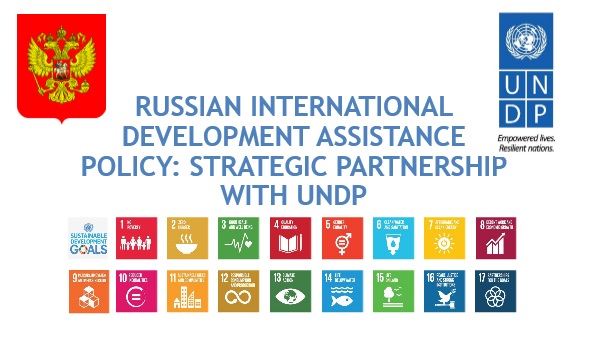
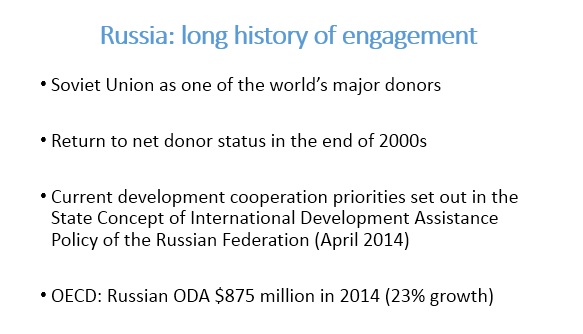
The
About
7 years ago, the
Since then, our country has become an active global development cooperation partner. Currently, international development assistance is a key component of our foreign policy, and it is increasing in scope and maturing in nature.
It is important to note that the Russian development assistance is fully in line with national priorities of our partner countries, as well as the overall framework of the MDGs and the SDGs.
The
current priorities of our international development assistance, as well as its objectives
and principles are set out in the State
concept of international development assistance policy of the
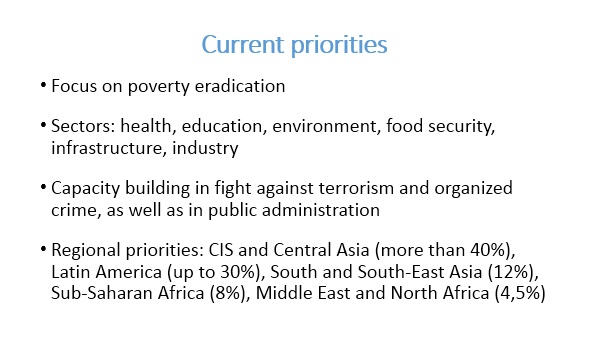
The sectors that are mainly targeted by
projects and programmes supported by
The State concept of international development assistance policy also stipulates that the projects are mainly focused on (but not limited to) the CIS and Central Asian regions, with particular attention to the Eurasian integration processes.
Naturally, the countries of our region are among our strategic partners due to historic, cultural, economic and political links and ties that we share. 2013 has seen a major shift in our development assistance towards these countries, where we now channel more than 40% of the funding.
Nevertheless,
we do not intend to limit our national development assistance policy only to
the Eurasian space. Among other
recipients of our aid are countries of Latin America (up to 30%), South and
South-East Asia (about 12%), Sub-Saharan Africa (about 8%) and Middle East and
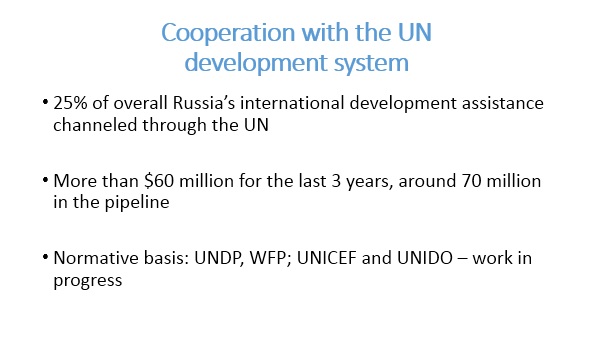
Assistance channeled through the UN system amounts to 25% of Russian development aid. For us the UN system is a reliable and high-quality partner with strong capacities in the area of project implementation, needs assessment, monitoring, evaluation and reporting.
In the last three years, we have allocated more than 60 million USD to the implementation of projects of various funds and programmes, in addition to contributions paid to their regular resources. Further projects for up to 68 Million USD are currently in the pipeline.
Building on this experience, we started working on a solid normative basis for cooperation with leading agencies of the UN development system. This work has already resulted in signing partnership agreements that are strategic in their nature. Among others, the two most recent examples are agreements signed with UNDP and WFP. Similar work is underway with UNICEF and UNIDO.
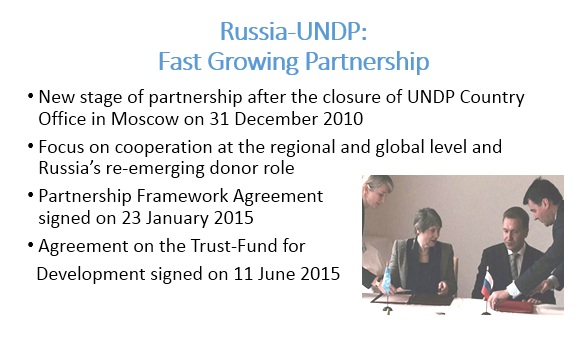
We consider
the Partnership Framework Agreement with
UNDP as a major breakthrough in our cooperation with the Programme. It was
signed by the First Deputy Prime Minister of Russia Igor Shuvalov and UNDP
Administrator Helen Clark in January 2015. Overall, it is aimed at enabling our
country to share knowledge, expertise and build capacities in other partner states,
especially within our region and integration processes with
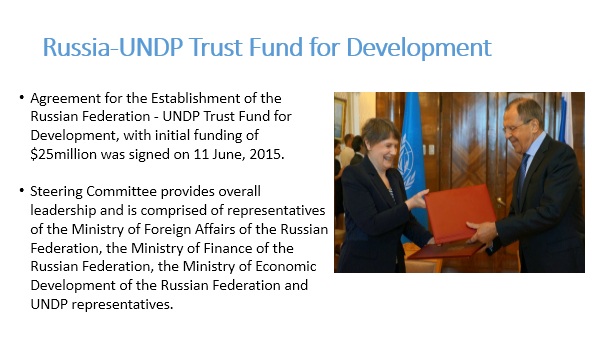
The
Agreement to create the Russia-UNDP
Trust Fund for development was signed in June 2015 by Administrator Clark
and Minister Lavrov. Current financial commitments of
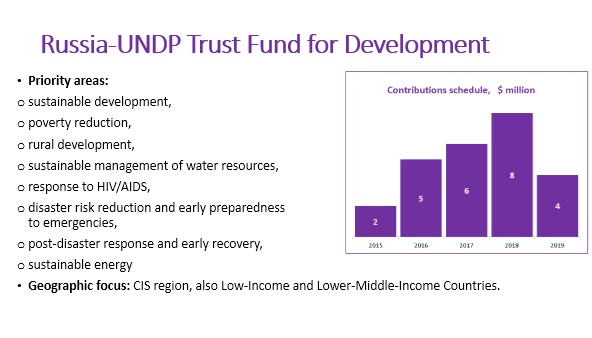
The activities supported by the Fund will focus, inter alia, on poverty eradication, disaster risk reduction and early preparedness for emergencies, as well as energy and environment.
In
this regard I would like to note the important role of the UNDP Regional Bureau
for Europe and the CIS, its Director Ms. Cihan Sultanoglu and her teams in
UNDP has become the first UN entity with which we developed a comprehensive and strategic agenda of cooperation, which again proved its status as the leading and one of the most effective UN development agencies.
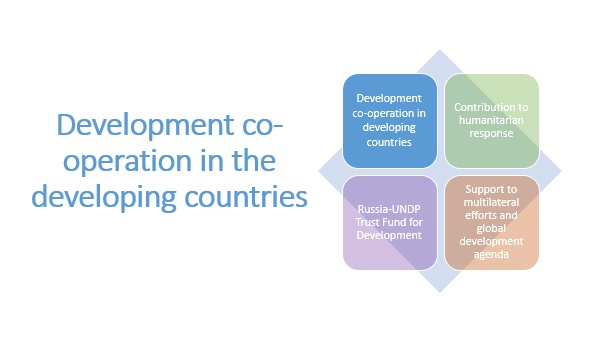
Over the last 3 years,
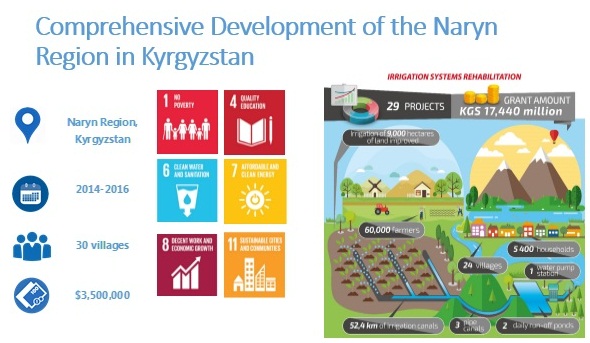
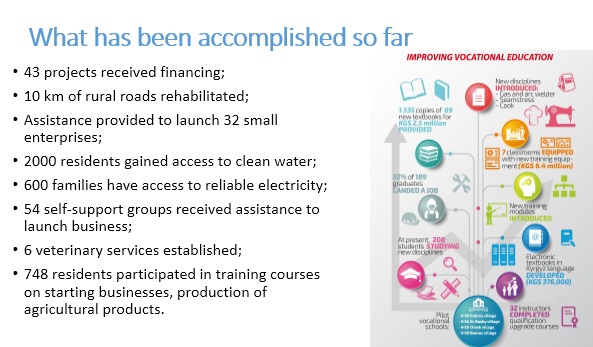
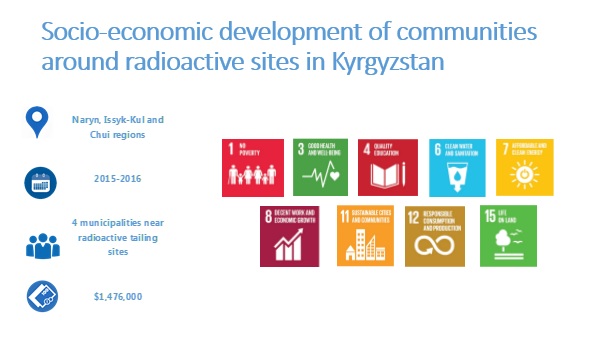
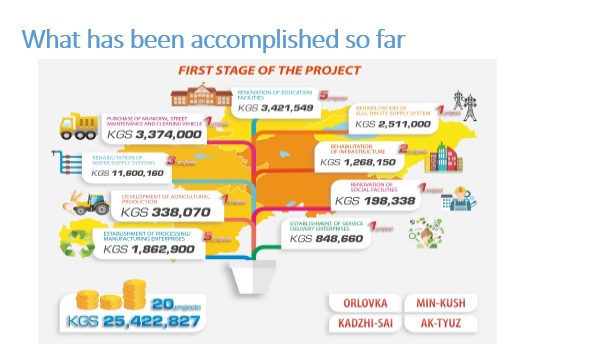
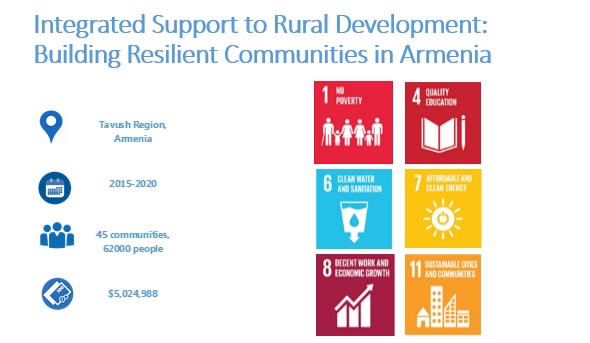
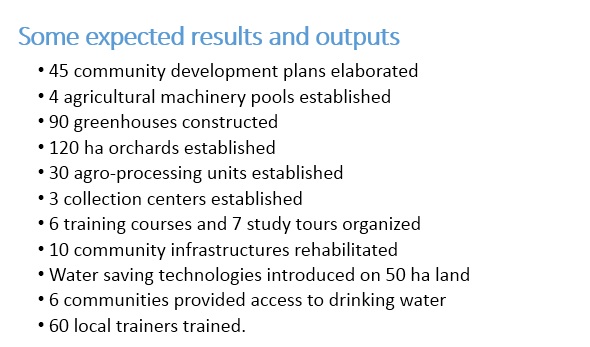
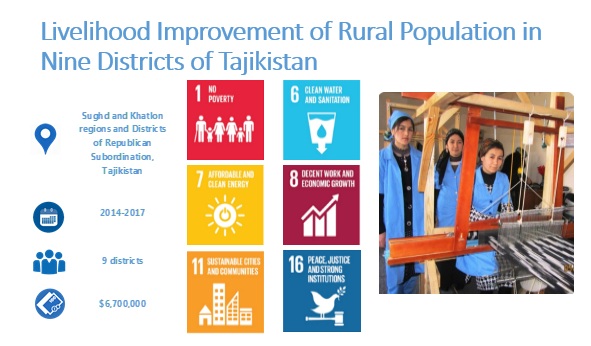
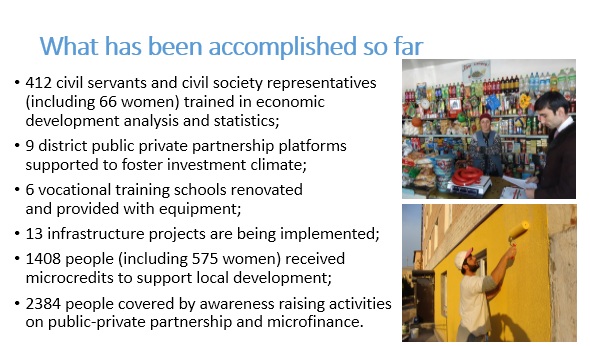
A significant number of activities is already underway, including capacity building of civil service and civil society, microcredit support, facilitation of public-private partnership, infrastructure development and awareness raising among population. The efficiency of this project is ensured by direct contact with beneficiaries and opportunity to focus on the problems of local rural development relevant to certain districts, taking into account their particular nature.
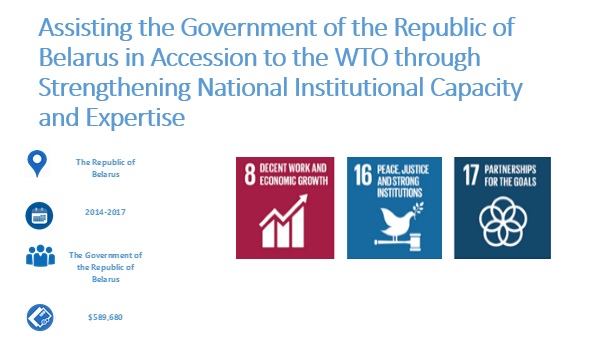
Another project in our
development assistance portfolio is entitled “Assisting the Government of the Republic of Belarus in Accession to the
World Trade Organization through Strengthening National Institutional Capacity
and Expertise”. We are currently in the
fourth phase of the implementation of this project that was supported by
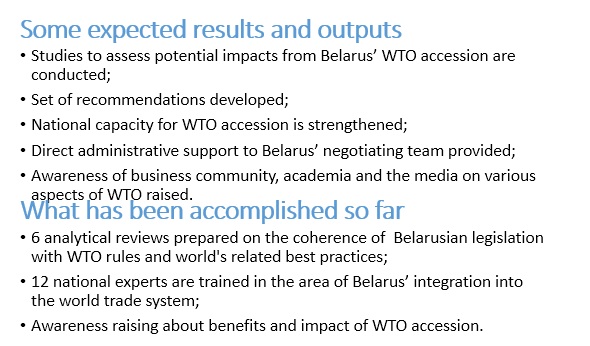
It is aimed at preparing analytical reviews concerning
compliance of the Belarusian legislation with the norms of the WTO basic
agreements and prospects of its improvement, training of national experts in
the area of integration into the world trade system, raising public awareness
about benefits and impact of WTO accession. This work is receiving a positive
feedback, with UNDP being a key partner of the Government of the
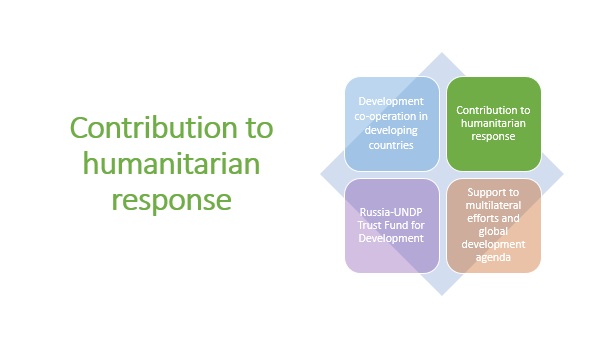
Another factor that has influenced our cooperation with UNDP is an unprecedented increase
in demand for humanitarian assistance.
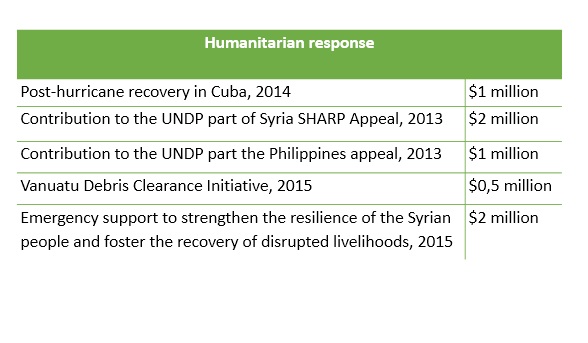
Since
2013 we have supported UNDP’s activities in the framework of multiple humanitarian appeals, including for
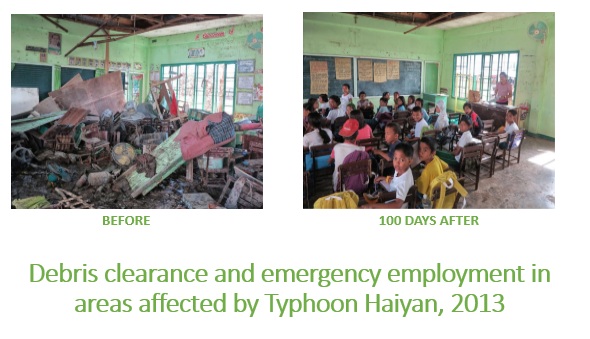
For
example, the Russian contribution to the UNDP project “Time critical debris
disposal and management in areas affected by Typhoon Haiyan” played a critical
role in initiating the debris clearance activities in the Philippines, helped
provide cash for work employment to more than 40 000 women and men workers
and paved the way for longer term recovery and reconstruction efforts.
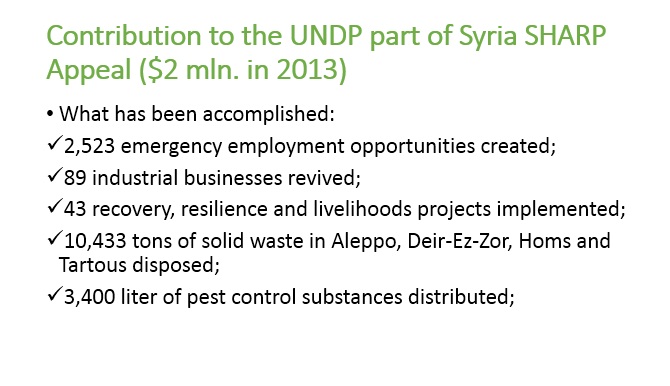
The
funding provided by Russia to UNDP within the Syrian appeal in 2013 helped
to improve living conditions of more than 800 000 affected people and
create an enabling environment for humanitarian assistance, reducing the demand
for humanitarian relief, and enhancing the resilience of affected communities.
We have recently renewed UNDP
funding for
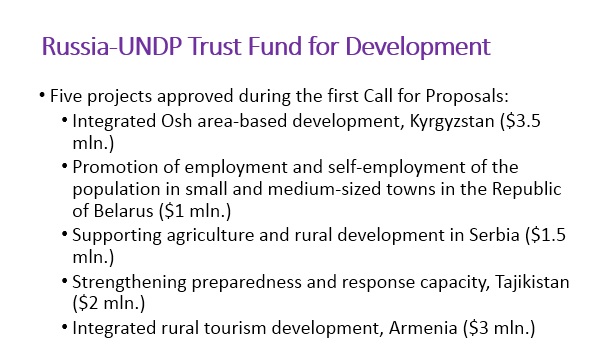
The Steering Committee of the Russia-UNDP Trust Fund for development approved the first five projects for funding: “Integrated Osh area-based development” in Kyrgyzstan, “Promotion of employment and self-employment of the population in small and medium-sized towns in the Republic of Belarus”, “Supporting agriculture and rural development in Serbia”, “Strengthening preparedness and response capacity” in Tajikistan and “Integrated rural tourism development” in Armenia.
All these projects are relevant to the priorities of our partnership with UNDP, include sustainable outcomes, are innovative and contain an important element of knowledge transfer. Decisions on funding additional projects can be made at the next Steering Committee meeting that will take place in two months.
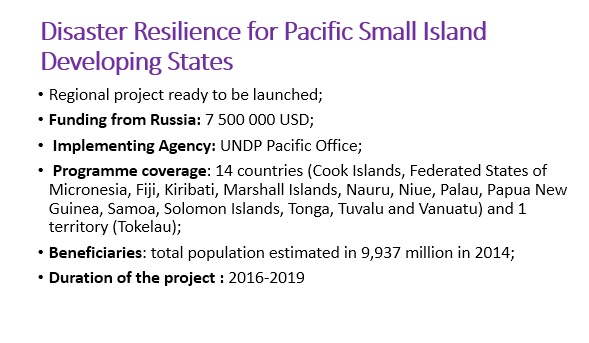
Finally, today we would like to launch the regional project “Disaster Resilience for Pacific Small Island Developing States” that was approved for funding from the Trust Fund in December 2015.
The overall project goal is to effectively address the consequences of, and responses to, climate-related natural hazards. At the outcome level it will strengthen early warning systems, climate monitoring capacity, preparedness and planning mechanisms, management tools for disaster recovery in countries of the region. This project will focus on a few key niches and countries where Russian assistance can have maximum impact. The project will also provide an opportunity to draw on Russian expertise, specifically through the National Emergency Management Centre (EMERCOM) and the Russian Federation Service for Hydrometeorology and Environmental Monitoring (ROSHYDROMET).
We are confident that our joint efforts will help us significantly improve the resilience of the Pacific SIDS to climate-related hazards.
I believe
that Mr. Haoliang Xu, UNDP Regional Director for
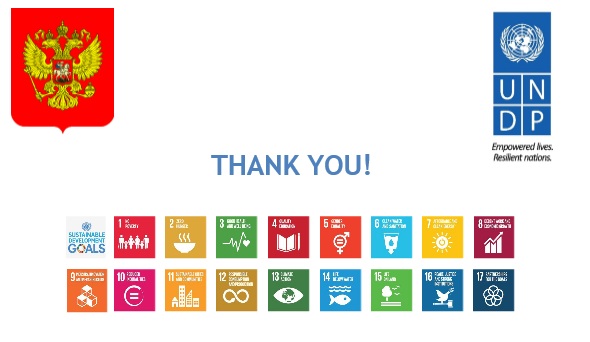
I
would like to thank Ms. Helen Clark, UNDP Administrator, Permanent
Representatives, UNDP Regional Directors and delegates for your presence and
for your attention. We hope to develop our partnership even further and stand
ready to work together in order to achieve the goals set out in the new global
sustainable development agenda.
